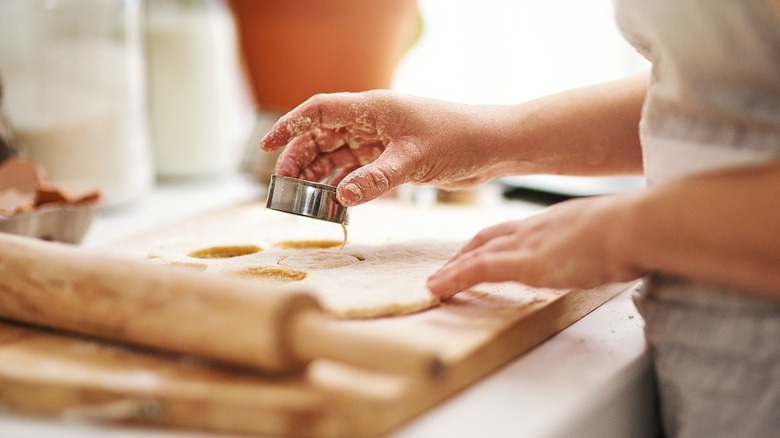How To Avoid Shrinking Pastries, According To Paul Hollywood
Sometimes, our ovens can seem like little magic boxes. You put one item in, whether it be a cake, batch of cookies, or delicate layered pastry, and out comes something totally different. On some days, that can look like a perfectly baked batch of brownies and treats, and on other days, it can look like something went a little bit wonky. Such is the case if you've ever placed a tray of pastries in the oven and noticed that instead of growing in size, they look like they were hit with a shrink gun.
Paul Hollywood, judge of the popular "The Great British Baking Show," shared one of the likely causes of this issue on his blog. The self-proclaimed "King of Bread" and master baker pointed to over-handling as the reason for shrinking pastry, also noting that under-rested pastry will exhibit signs of shrinkage.
The science of shrinkage
There is a long chain reaction of how overworking pastry results in it shrinking as it bakes. "Pastry," as we're referring to it here, is made from butter, flour, water, and salt. This goes for many different types of pastry, including things like turnovers, croissants, and even pie crust. The butter, made up of fat and water, in the crust is what allows it to rise. When the buttery dough hits the heat of the oven, the water transforms to steam and gives the crust or pastry its signature layers.
Overhandling the pastry, either by mixing or touching it too often, will cause the butter to melt and fuse with the flour. Less butter means your pastry has less opportunity to puff when it hits the oven. Moreover, the water has to go somewhere — in this case, it mixes with the gluten in the flour. Some gluten structure is important, as you need it to trap the steam released as the pastry bakes. But too much will leave you with an elasticky, stodgy piece of pastry that's more akin to bread than a delicate turnover.
Fear not, there are some things that you can do to prevent your pastry from becoming overworked and warm. For one, chill your dough as often as possible. Not only will it give your butter a chance to solidify, but it will allow the gluten to relax. You also only need to work the dough just enough so it comes together. If your pastry is giving you signs that it's fighting back (like when it fails to keep its shape after you roll it), it may be an indication that it needs a time-out on the bench before it can come back into play.

